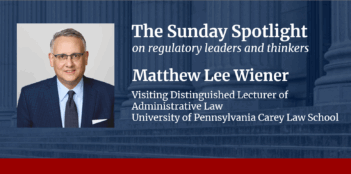
Legal scholars present new ways to teach students regulatory law against the backdrop of an expanding regulatory state.
The teaching of administrative law has grown increasingly vital in light of the U.S. regulatory state’s dramatic expansion over the last several decades. Despite this expansion, the typical administrative law class offered in law schools has remained largely unchanged, focusing on issues surrounding the design of administrative agencies, administrative procedures, and judicial review of administrative action. Although these traditional administrative law issues remain important to cover, legal scholars are starting to recognize the need for still greater and more specialized coverage of administrative and regulatory law within the law school curriculum.
That is why earlier this year Kristin Hickman, a professor at the University of Minnesota Law School, organized a special panel, Designing a Broader Regulatory Practice Curriculum, at the annual meeting of the Association of American Law Schools in New York City. Following this well-received panel, The Regulatory Review invited all of the panel speakers to write essays distilling their comments. With the new school year upon us, The Regulatory Review is pleased to feature these essays through this series, which presents ideas from some of the leading innovators in regulation education.
As the regulatory state continues to evolve, law schools face the challenge of providing their students with a foundation in administrative and regulatory law that involves far more than standard introductory courses. Through this series, The Regulatory Review highlights several new and successful ways that administrative and regulatory law can be approached to meet the needs of law students who today enter a world of practice that involves an extensive engagement with regulatory law created by administrative agencies. The series includes five essays, beginning with an overview by Professor Hickman, who identifies core components of a regulatory practice curricular track and offers examples of specialized courses that focus on regulatory practice.
Designing a Broader Regulatory Practice Curriculum
August 15, 2016 | Kristin E. Hickman
When I was in law school in the late 1990s, my classmates and I received the message that legal employment generally fell into one of two categories: litigation or transactional. Whether that message was accurate then is debatable. Today, that message is flat wrong. Law schools need to recognize a third employment track that at least matches, if not dwarfs, the other two: regulatory practice.
On Teaching Compliance
August 16, 2016 | Geoffrey Parsons Miller
The rise of compliance as a law school course raises an obvious question: Where does it fit within the curriculum? A similar problem is now presented by the law of compliance. Like administrative law—although not on as large a scale—the law of compliance is developing into an independent field of study, owing to its roots in other fields, but also presenting unique problems.
A Different Approach to Teaching Regulatory Law and Policy
August 17, 2016 | Sidney A. Shapiro
After the introduction of first-year courses on the regulatory state, the argument that law students should have greater exposure to regulatory law and policy has gained traction within recent years. Our course’s approach is different, however, because it educates students on how and why politics, policy, and law influence regulatory decision-making. Acquiring basic knowledge such as this, students gain a foundation in any regulatory subject.
Rethinking the Compliance Curriculum
August 18, 2016 | D. Daniel Sokol
One trend in the legal academy is to add a “compliance” course to law school curricula. Yet, seldom do academics give enough thought to the design of such courses. The place to start is to recognize that compliance is about risk. Compliance training should focus on risk definition, assessment, and the management of risk, which requires the identification of risk and ex ante preventative action.
Teaching Regulatory Law Through Online Publishing
August 22, 2016 | Cary Coglianese
Students at the University of Pennsylvania Law School enjoy a distinctive opportunity to learn about administrative law and regulatory policy through the production of this publication,The Regulatory Review. For students who participate in The Regulatory Review, not only do they gain in-depth knowledge about regulation, but they hone vital professional skills in an experiential setting in which they must interact professionally in support of a collective publishing enterprise.



